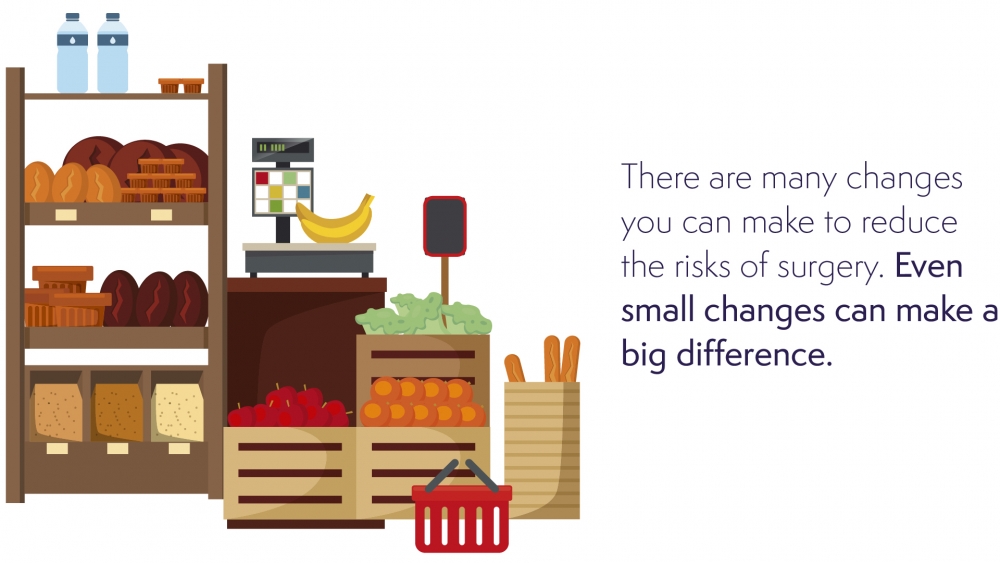Preparing your body

Lifestyle changes
There are many changes you can make to reduce the risks of surgery.
Small changes, even over a short time, can make a big difference.
Exercise
Your heart and lungs have to work harder after an operation to help the body to heal. If you are already active, they will be used to this. While you are waiting for your operation, try and increase your activity levels.
Brisk walking, swimming, cycling, gardening or playing with your children or grandchildren are all helpful. Swimming can be helpful for those with obesity or joint pain. Try to do any activity which makes you feel out of breath at least three times per week. Start slowly and stay within your limits. Take advice if exercise is difficult for you. Stop and ask for medical advice if you develop new problems including chest pain, dizziness or your heart beat becomes irregular. Activities that improve your strength and balance will also be useful for your recovery, for example daily ‘sit-to-stand’ exercises.
You can see some examples here.
Who can help me?
-
There are a number of mobile apps to help you set goals and track your progress, such as ‘Active 10’ and ‘Couch to 5K’. More information here.
- Try joining a free council or community walking group or environmental volunteering scheme in your local area. As well as giving you encouragement and support to start walking and exercising, they are enjoyable and will boost your mood. Ask your GP surgery what is available in your area.
- If you have back or joint pain and you see a physiotherapist, ask them for exercises that you can do. There is also information on exercising with arthritis here.
- For people who are frail, a gentle walk every day, sit-to-stand exercises, stairclimbing and reducing time sitting are a good start.
- Depending on where you live you may have access to NHS ‘health trainers’ who can help motivate you and offer advice.
These are only some ideas and there will be many health and fitness programmes that you can explore in your local area.
Healthy diet
Your body needs to repair itself after surgery – eating a healthy diet before and after your surgery can really help. This means getting enough protein and ‘5 a day’ or more of fruit and vegetables. These help wound healing and your immune system.
Who can help me?
The following website has useful resources and information:
Your GP surgery may be able to give you some advice and information
on healthy eating if they have a dietitian service.
Weight
If you are overweight, losing weight can help reduce the stress on your heart and lungs. You can find out if you’re a healthy weight using the NHS BMI healthy weight calculator.
Losing weight can also help you to:
- lower your blood pressure
- improve your blood sugar level
- reduce pain in your joints
- reduce your risk of blood clots after surgery
- reduce your risk of wound infections after surgery
- allow you to exercise more easily
- reduce the risks associated with having an anaesthetic.
More information about the benefits of losing weight before an operation and the increased risks of having surgery with obesity can be found here.
Who can help me?
There will be local weight loss schemes and exercise opportunities in your area. The NHS has a Weight Loss Plan app. Your GP surgery or pharmacy may be able to weigh you and signpost you to advice on healthy eating. If you have obesity, your GP may also refer you for bariatric (weight loss) surgery to reduce the risks and improve your outcomes before they refer you for other procedures. Some councils also have schemes that can support you so it is also worth looking at your local council website or contacting them.
You may find it helpful to join a weight loss class. In some areas, NHS health trainers may be available to help you.
More information and additional resources can be found at Better Health – Lose weight.
Alcohol
Alcohol can have many effects on the body, but importantly it can reduce the liver’s ability to produce the building blocks necessary for healing. If you drink regularly you should make sure you are drinking within the recommended limits or lower. If you drink more than this, you should also aim to cut down before your operation to improve your body’s ability to heal after surgery and to avoid withdrawal symptoms during your stay in hospital.
Who can help me?
You can find information on recommended limits and how to reduce the amount of alcohol you drink on the following websites:
Smoking
Stopping smoking is hard, but the good news is that quitting or cutting down shortly before surgery can reduce your length of stay in hospital and improve wound healing and lung function. Preparing for surgery offers a real opportunity to commit to stopping smoking.
Who can help me?
Find out if there is a local Stop Smoking Service in your area. You can check here.
The following organisations have useful information on the benefits of quitting smoking before surgery:
- The Cure Project – a helping hand to stop smoking: this gives useful information about the added benefits of stopping smoking early before surgery.
- Action on Smoking and Health (ASH):
